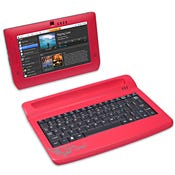Freescale Intros Tablet PC PrototypeFreescale Intros Tablet PC Prototype
The hybrid smartphone and netbook would cost significantly less than netbooks, chipmaker says.


Freescale Tablet PC Prototype
(click image for larger view)
Freescale Tablet PC Prototype
Freescale Semiconductor on Monday introduced a reference design for an Internet-enabled tablet computer that would be a third of the size of an average netbook and would have up to four times the viewing area of a typical smartphone.
The device will be demonstrated Jan. 7-10 at the International Consumer Electronics Show in Las Vegas, Nev. The so-called "smartbook" resembles an electronic-book reader, such as Amazon's Kindle, and includes a seven-inch touchscreen and an optional keyboard accessory.
Freescale says the device can be sold for about $200 with only a Wi-Fi connection. Adding support for wireless carriers' 3G networks would add from $50 to $75. The chipmaker's design would run on Freescale's ARM processor.
A smartbook is a Web-enabled device that's a hybrid smartphone and netbook. The gadgets have been available for several years, but have had little success in attracting buyers. "As general-purpose devices, smartbooks are in a huge wasteland… Explain to me what's been done with the software [for smartbooks] to make it a compelling experience that I can't get with a netbook or smartphone," Avi Greengart, analyst for Current Analysis, told information in June.
Freescale's reference design appears to position smartbooks as a competitor to netbooks, mini-laptops that were the hottest-selling PC category last year. If smartbooks are available for a starting price of around $200, then they would be significantly less than netbooks, which range from $300 to $500.
"If you're definition of a netbook is a device designed to surf the Internet, then yes, that is the target market for this device," Glen Burchers, consumer segment marketing director for Freescale, told information.
Freescale believes its smartbook design will be more appealing than netbooks to young people from ages 12 to 25 who want a device that can connect to the Internet quickly to surf and to access social networks, such as Facebook, Twitter and YouTube. The device would also be suitable for light gaming.
Freescale says its design would take three seconds to get on the Web with a Wi-Fi connection and have 12 hours of battery life. Software that could run on the chipmaker's platform would include a Web browser, Adobe Flash player, PDF and image viewers, an e-mail client, RSS reader, office suite, handwriting utilities and various widgets for Twitter, Facebook, Flickr, weather and other services.
As Apple has shown with the iPhone, having lots of useful software is key to making a device successful. Therefore, having an Apple-like App Store available for developers to offer smartbook applications would be critical. Freescale expects such an online store to be launched eventually, but is unable to offer a timetable.
The device Freescale plans to show at CES will run a derivative of Ubuntu Linux developed by software partner Thundersoft. Burchers said Freescale is working with Google on possibly porting its Android smartphone OS or Chrome OS to smartbooks.
Having Google's marketing and development muscle behind smartbooks could provide a big boost to the mobile device category. Google, for example, has launched an online app store for Android smartphones.
However, the Android OS would have to be beefed up to support screen resolutions of at least 1024 x 600 pixels to be useful for smartbooks, Burchers said. Android today supports 800 x 600 pixels.
Freescale's reference design is for a device that would run on an ARM Cortex-A8 CPU, OpenVG and OpenGL/ES graphics cores and a high-definition video decoder. There would be 512MB of system memory, 4 to 64 GB of storage, a 3 megapixel camera capable of recording video at 30 frames a second and a battery charging system for both USB and wall charging. The device would include support for Wi-Fi, 3G and Bluetooth wireless technologies and would also have a global positioning system (GPS).
Freescale expects its reference design to be available to hardware manufacturers for evaluation beginning in February. In the meantime, Freescale won't be without competition. Lenovo, for example, is expected to introduce at CES a smartbook running rival Qualcomm's Snapdragon processor and Linux software.
About the Author
You May Also Like




